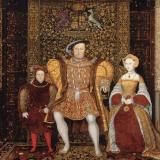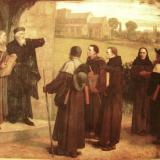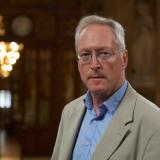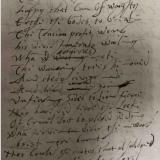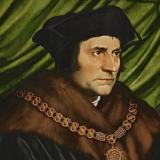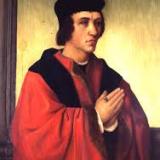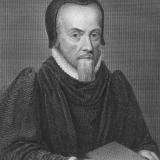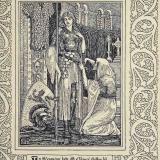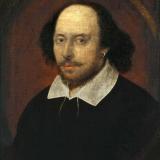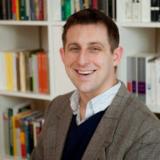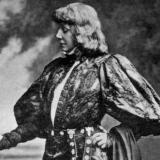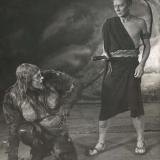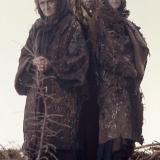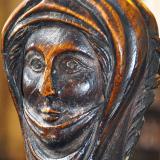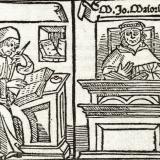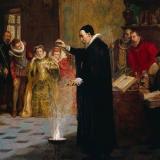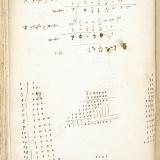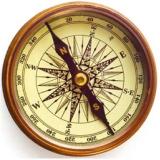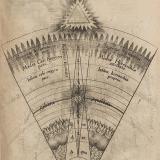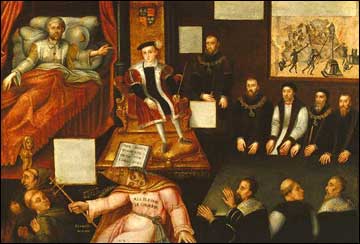Renaissance and Reformation in Britain
Under the Tudor monarchs Henry VIII and Elizabeth I, the Reformation was introduced in England; Protestantism also spread to Scotland by the end of the 16th century. In these episodes we examine the intertwined development of religious, philosophical, and scientific ideas in Britain during this period (with an occasional look back to thinkers of the 15th century who paved the way). A highlight of this series is the group of episodes centered on the plays of Shakespeare, with forays into broader related issues like witchcraft and individualism, using Macbeth and Hamlet as a way into these topics. Scholasticism continues to be important in our story too, as we cover this phenomenon from John Mair in the late 15th century, to John Case in the late 16th century. We also look at British humanists like Thomas More, author of the famous Utopia, George Buchanan, and Andrew Melville, and scientists like William Gilbert, John Dee, and the members of the Northumberland Circle (especially Thomas Harriot). As always, women are highlighted too, with an episode on Margery Kempe, Anne Locke, and other female authors of devotional literature. We're joined as always by expert interview guests too, including Diarmaid MacCulloch, Patrick Gray, Calvin Normore, and Jennifer Rampling!
• A.G. Dickens, The English Reformation (London: 1964).
• E. Duffy, The Stripping of the Altars (New Haven: 1992).
• G.R. Elton, Reform and Reformation 1509-1558 (London: 1977).
• Christopher Haigh, English Reformations (Oxford: 1993).
• W.P. Haugaard, Elizabeth and the English Reformation (Cambridge: 1968).
• W.I.P. Hazlett, The Reformation in Britain and Ireland (London: 2003).
• W.K. Jordan, The Development of Religious Toleration in England, 4 vols. (Cambridge MA: 1932-40).
• D. MacCullough, The Later Reformation in England 1547-1603 (New York: 1990).
• D. MacCulloch, Tudor Church Militant (London: 1999).
• P. Marshall, Reformation England 1480-1642 (London: 2012).
• P. Marshall, Heretics and Believers: a History of the English Reformation (New Haven: 2017).
• J.J. Scarisbrick, The Reformation and the English People (Oxford:1982).
• N. Tyacke (ed.), England’s Long Reformation 1500-1800 (London: 1998).
Posted on
The historical context of English philosophy in the sixteenth century, with particular focus on Thomas Cranmer, and the role of religion in personal conscience and social cohesion.
Posted on
John Knox polemicizes against idolaters and female rulers, while the humanist George Buchanan argues more calmly for equally radical political conclusions.
Posted on
A leading expert on the history of the Reformation joins us to explain the very different stories of England and Scotland in the 16th century.
Posted on
Humanism comes to England and Scotland, leading scholars like Thomas Eylot and Andrew Melville to rethink philosophical education.
Image: Queen Elizabeth's translation of Boethius
Posted on
What is the message of the famous, but elusive, work Utopia, and how can it be squared with the life of its author?
Posted on
The evolution of ideas about kingship and the role of the “three estates” in 15th and 16th century England, with a focus on John Fortescue and Thomas Starkey.
Posted on
Richard Hooker defends the religious and political settlement of Elizabethan England using rational arguments and appeals to the natural law.
Posted on
We begin to look at Elizabethan literature, as Sidney argues that poetry is superior to philosophy, and philosophy is put to use in Spenser’s Fairie Queene.
Posted on
How should we approach Shakespeare’s plays as philosophical texts? We take as examples skepticism and politics in Othello, King Lear, and Julius Caesar.
Posted on
We're joined by Patrick Gray to discuss Shakespeare's knowledge of philosophy, his ethics, and his influence on such thinkers as Hegel.
Posted on
How the Renaissance turn towards individual identity is reflected in Shakespeare's most famous play.
Posted on
Can Shakespeare’s Tempest be read as a reflection on the English encounter with the peoples of the Americas?
Posted on
How Macbeth reflects the anxieties and explanations surrounding witchcraft and witch-hunting in early modern Europe.
Posted on
How women’s writing in England changed from the early fifteenth century, the time of Margery Kempe, to the late sixteenth century, the time of Anne Lock.
Posted on
The evolution of Aristotelian philosophy from John Mair in the late 15th century to John Case in the late 16th century.
Posted on
A discussion of the history and philosophical significance of scholasticism from medieval times to early modernity, and even today.
Posted on
Science, intrigue, exploration, angelic seances! It's the life and thought of Elizabethan mathematician and magician John Dee.
Posted on
How scientists of the Elizabethan age anticipated the discoveries and methods of the Enlightenment (without necessarily publishing them).
Posted on
Changing ideas about eyesight, light, mirror images, and refraction – and the skeptical worries they may have inspired.
Posted on
The cosmological and methodological implications of breakthroughs in the understanding of magnetism and electricity at the turn of the 17th century.
Posted on
Our last figure of the English Renaissance undertakes daring investigations of chemistry, medicine, agriculture, and cosmology – and gets accused of magic and Rosicrucianism.
Posted on
An expert on Renaissance alchemy tells us how this art related to philosophy at the time... and how she has tried to reproduce its results!




